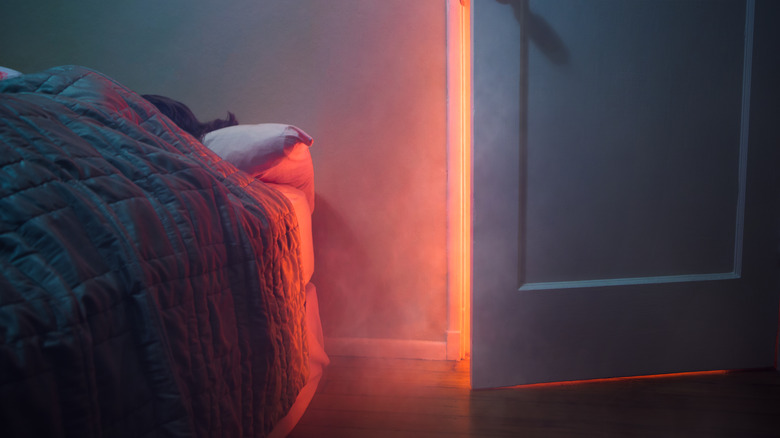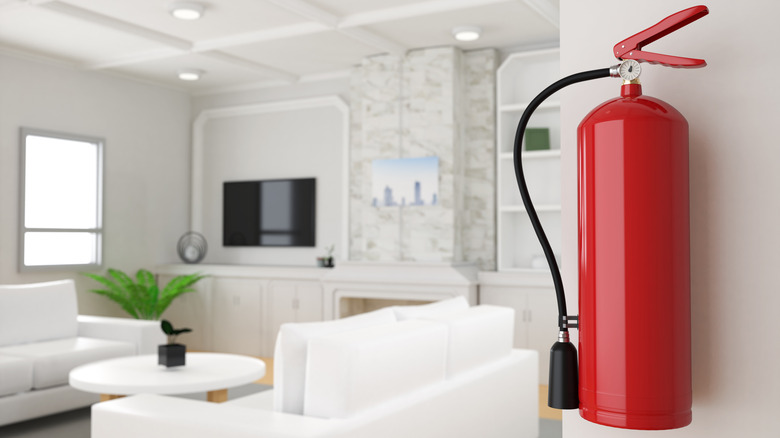The Reason It's Safer To Go To Bed With A Closed Door
Who knew that something as simple as closing your bedroom door before you sleep could significantly impact your safety? It's an action that takes mere seconds, yet it's often overlooked. The importance of this habit extends far beyond creating a quiet, disturbance-free sleep environment. In the dire circumstances of a house fire, your closed bedroom door serves a much greater purpose. It stands as a protective barrier against house fires. Generally speaking, this seemingly small nightly ritual could mean the difference between danger and safety, dramatically amplifying your chances of surviving.
But remember, a closed door isn't the entire battle won. It's merely a component, albeit a crucial one, of a comprehensive fire safety plan. The protection of your home and loved ones also necessitates the inclusion of functional smoke detectors and the habitual practice of fire drills. We'll explore and elucidate the significance of that closed door and examine additional measures you can undertake to fortify your home against fire-related mishaps. With this knowledge in your arsenal, you're taking an active role in your safety, ensuring you and your family are not left vulnerable.
Slowing the spread of fire and smoke
Fires need three elements: fuel, heat, and oxygen. This is often referred to as the fire triangle. A fire cannot begin or spread if any one of these components is missing. Since a fire burns more quickly and fiercely with more oxygen, by closing your door, you reduce the oxygen that it has access to and restrict the spread of the fire. To raise awareness, Underwriters Laboratories (UL), Firefighter Safety Research Institute (FSRI) initiated the "Close Before You Doze" campaign. The campaign is supported by more than a decade's worth of research that demonstrates how a closed door may considerably delay the spread of flames, reduce harmful smoke, increase oxygen levels, and lower temperatures in the event of a fire.
Additionally, smoke, also known as "the silent killer," is far deadlier. It spreads faster and farther than heat and flames and carries toxic gases that can disorient and harm you. By closing your door, you are essentially blocking a significant portion of this smoke from reaching you, enhancing your safety. There's also the fact that fires are more common at night than in the daytime. The Federal Emergency Management Agency (FEMA) notes that 49% of most home fires occur at night between 11 p.m. to 7 a.m., which further justifies why doors should be closed at night.
Other measures to protect your home
To fully protect your home, install smoke detectors inside and outside each bedroom and on each floor of your home, as recommended by the National Fire Protection Association. Additionally, test these detectors once a month to ensure they're working properly, and replace the batteries at least once a year. Equipping your home with fire extinguishers is another crucial step. Place them in key areas like the kitchen and main entrance, and be certain that all members of your household know how to use them — you might think that everyone knows how to use a fire extinguisher, but in a moment of panic, it is better to be certain.
Also, try to regularly inspect your home for fire hazards. This can include checking electrical cords for fraying or other signs of wear and tear. Be cautious of overloading electrical outlets and always unplug appliances when they're not in use. Another important action to take is to establish and practice a fire escape plan with your family. Each room should have two exit points, and all family members should know the quickest route to safety from any part of the house, as advised by NFPA. Lastly, hold regular fire drills to ensure everyone knows what to do in case of a fire — your vigilance and preparedness today can prevent a disaster tomorrow.


